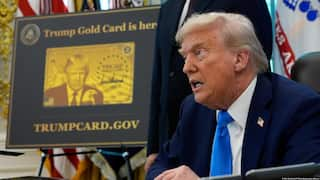RBI Pushes Banks To Adopt Direct Rupee-Dirham Transactions With UAE
Rupee-Dirham Transactions: The RBI's decision aligns with India’s larger goal of promoting trade settlements in rupees and decreasing its dependency on the US dollar

Rupee-Dirham Transactions: The Reserve Bank of India (RBI) has advised banks engaged in trade with the United Arab Emirates (UAE) to settle a portion of their trade payments directly in Indian rupees and UAE dirhams, multiple banking sources told Reuters. While the RBI has not imposed specific targets, it has requested regular reports from banks detailing the extent of such transactions. This move is an extension of a 2023 initiative, which encouraged banks to facilitate such payments following Indian Prime Minister Narendra Modi's visit to the UAE.
The central bank’s decision aligns with India’s larger goal of promoting trade settlements in rupees and decreasing its dependency on the US dollar. Globally, around half of the world’s trade is conducted in dollars, a fact highlighted by the Bank of International Settlements.
Efforts to further bolster local currency trade have also been observed in India's trade dealings with Russia, where Indian refiners have been using dirhams instead of dollars for payments on Russian oil procured via Dubai-based traders, as reported by Reuters.
The RBI has not yet responded to Reuter's inquiries for comment on the new directives.
To support the development of the rupee-dirham market, the RBI has urged banks to seek "matching flows" in dirhams from other banks when processing payments to the UAE. This would involve obtaining a direct rupee-dirham exchange rate from another bank, bypassing the dollar as an intermediary, according to one of the sources.
The UAE is India's third-largest trading partner, with bilateral trade valued at approximately $83 billion in the financial year 2023-24. This includes over $17 billion worth of oil and related imports from the UAE. India recorded a merchandise trade deficit of $12.4 billion with the UAE during this period. Encouraging local currency settlements could help reduce dollar outflows linked to the trade deficit.
Although the RBI has not mandated a full shift to rupee-dirham settlements, the central bank’s communication is seen as a clear signal to banks to explore alternatives to dollar-denominated trade, a second source familiar with the matter explained. This shift is intended to promote the development of a more robust rupee-dirham market, reducing India's reliance on the dollar in its international trade.






































